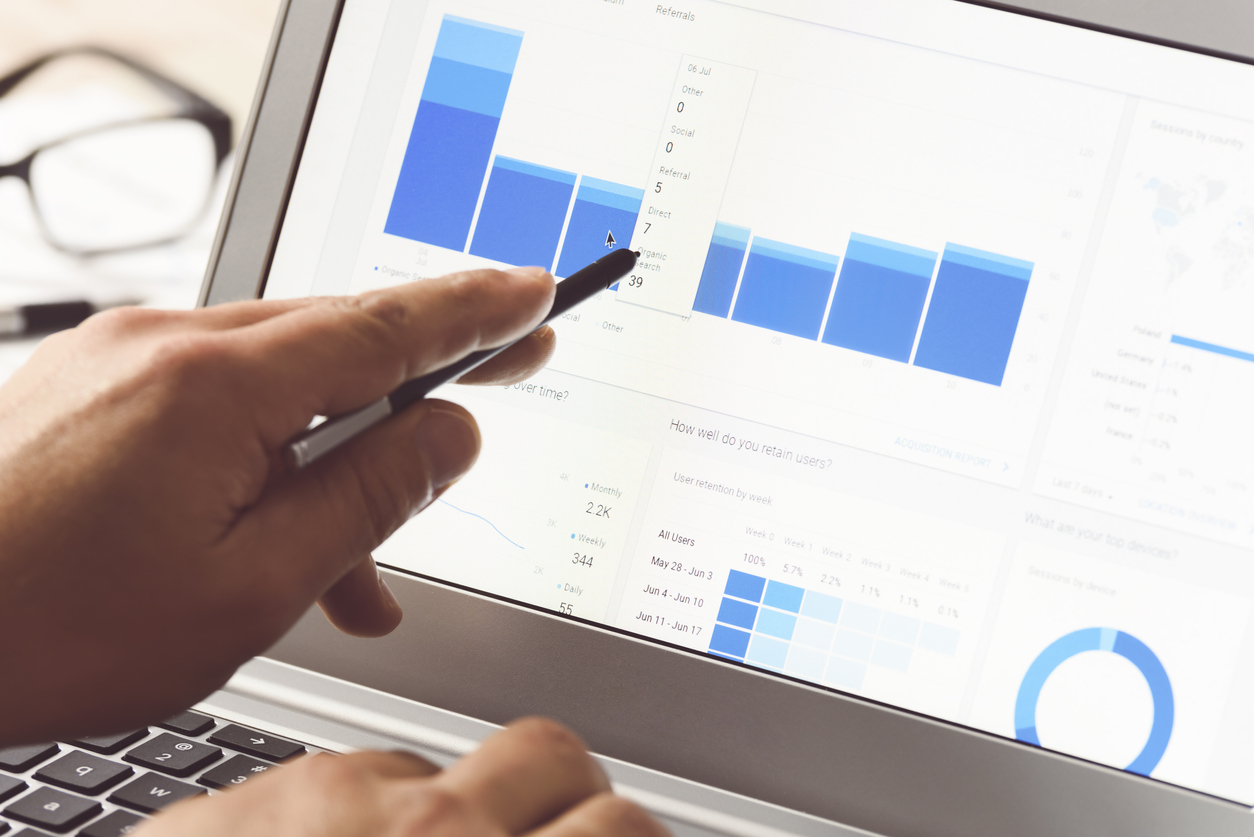 STRATEGY CALL
STRATEGY CALL
You’re a busy business owner. You've got your website up, your social media buzzing, and your products or services are top-notch. But how do you know if your digital marketing efforts are actually paying off? Enter the world of digital marketing analytics for small businesses.
Understanding these metrics can be a game-changer, but let's be real—many small and medium-sized businesses (SMBs) find it challenging to
grasp and leverage this data. We’ve put together a handy little guide to help you understand the basics of digital marketing analytics for
small businesses. For a more in-depth view, or help with your digital marketing strategy, call us today!
Digital marketing analytics is the collecting and analyzing data from all your digital channels to understand your business performance.
Unlike traditional marketing analytics, which often focus on overall business metrics, digital marketing analytics for small businesses dive
deep into online data, offering insights into customer behavior, engagement, and conversion. This information helps you make better informed
decisions in regard to your marketing strategy and budget allocation, allowing you to make the most of your marketing dollars.
Overall web traffic is pretty much exactly what it sounds like. It’s all of the traffic you get to your website, no matter how it got there. The main goal of all your marketing activities is to drive traffic to your website, as more traffic means more chances to convert visitors into loyal customers. Tracking your overall web traffic across all channels can show you which of your campaigns are working best to bring you traffic, which ones need attention, and where your marketing budget is most effectively spent.
Tips to increase your overall traffic include:

A session is a measurement of all the actions a user takes on your website, including page views, filling out forms, clicking buttons, and the like. A session automatically expires after 30 minutes of inactivity from a user, or ends when a user leaves your website. This is an important metric to track when it comes to digital marketing analytics for small businesses because it will help you understand the behaviour of your users when they are on your website, including what actions visitors are taking on your website, and how long they stay there.
You can increase your average session duration by:
New visitors are just as they sound – users who are visiting your site for the first time. Returning visitors are those that have already visited your website and are coming back for more. Returning visitors is usually a good indication that the content your are providing is valuable to your audience, which is why they have returned to your website. New visitors indicate that your SEO is performing well, as it is bringing you new traffic.
As far as digital marketing analytics for small businesses go, this is a great metric to keep an eye on to measure how different pieces of your content performs.
How do you improve this metric?
Page views are the number of times a particular page has been viewed. While this is a pretty general metric for digital marketing analytics for small businesses, it’s an important one to help find out which pages on your website your visitors find the most value in. Is it only certain pages that users are looking at, or are you getting page views across the whole website? If pages are not getting views, it may be time to update or scrap them.
Improve your page view metrics by:

Bounce rate is percentage of visitors who don’t take an action on your site and “bounce” after viewing a single page. This is vital in digital marketing analytics for small businesses because it helps us determine why people are leaving your site too quickly.
Common reasons for a higher bounce rate are:
Conversion rate is simply the percentage of completed goals (conversions) compared to the number of visitors to your website. It shows you how effective your campaigns are and helps identify which campaigns could use a little boost.
It’s a simple equation that shows you how many conversions you are getting from those that visitor your website:
Conversion Rate = conversions/visits
Tips for improving your conversion rate include:
Cost per acquisition is a measurement of how much you are spending to acquire each customer. We track CPA for digital marketing analytics for small businesses because it also affects your return on ad spend (or ROI.) Once you know how much you are spending to acquire a customer, you can determine how to better allocate your resources. If it’s costing you too much to acquire customers, you’re going to have to take a look at your strategy!
How to calculate CPA:
CPA = Total Marketing Costs / Number of New Customers

Click-through rate measures how often users click on things in your marketing campaigns. In digital marketing analytics for small businesses, this is often applied to your pay-per-click ad campaigns and clickable items in your emails. CTR is the ratio of users who click on a link to the number of total users who view the ad or page. It measures the effectiveness of your campaigns.
Tips to improve your CTR:
Cost pet click is a crucial metric in digital marketing analytics for small businesses when it comes to any paid advertising campaigns. It tells you how much each individual click on your ads is costing you. Once you know how much this is costing you, you can analyze your campaign budget, and optimize your ads. Optimizing your paid search ads for a low CPC frees up budget to spend elsewhere.
Suggestions to optimize your ads and lower your CPC include:
Now that we’ve given you which metrics to track, it’s helpful to know where to track them! This information is not useful to you if you don’t know where to find it! Below are a few fantastic tools for digital marketing analytics for small businesses.
With paid subscription tools like HubSpot and SEMRush, it is important to note that they can also be complex to learn, have an overwhelming amount of functions to navigate through for a beginner, and can be very expensive for a single location. While you can learn them (and pay for them!) on your own, an agency already has the knowledge and access to paid tools. It’s not a bad idea to partner with an agency and take advantage of their expertise and save some money by leveraging the agency’s subscriptions!

An agency takes the pressure off of busy business owners like yourself by collecting and analysing the data for you. This saves you from many pitfalls and challenges that small businesses owners can face such as:
Understanding and leveraging digital marketing analytics for small businesses is not just a "nice-to-have"; it's a must. So, if you haven't started, now's the time. And if you're already on it, keep refining your approach based on insights, whether this is on your own accord or with the help of an agency! To learn more about digital marketing analytics for small businesses, call Smart WSI Marketing today for a consultation.



